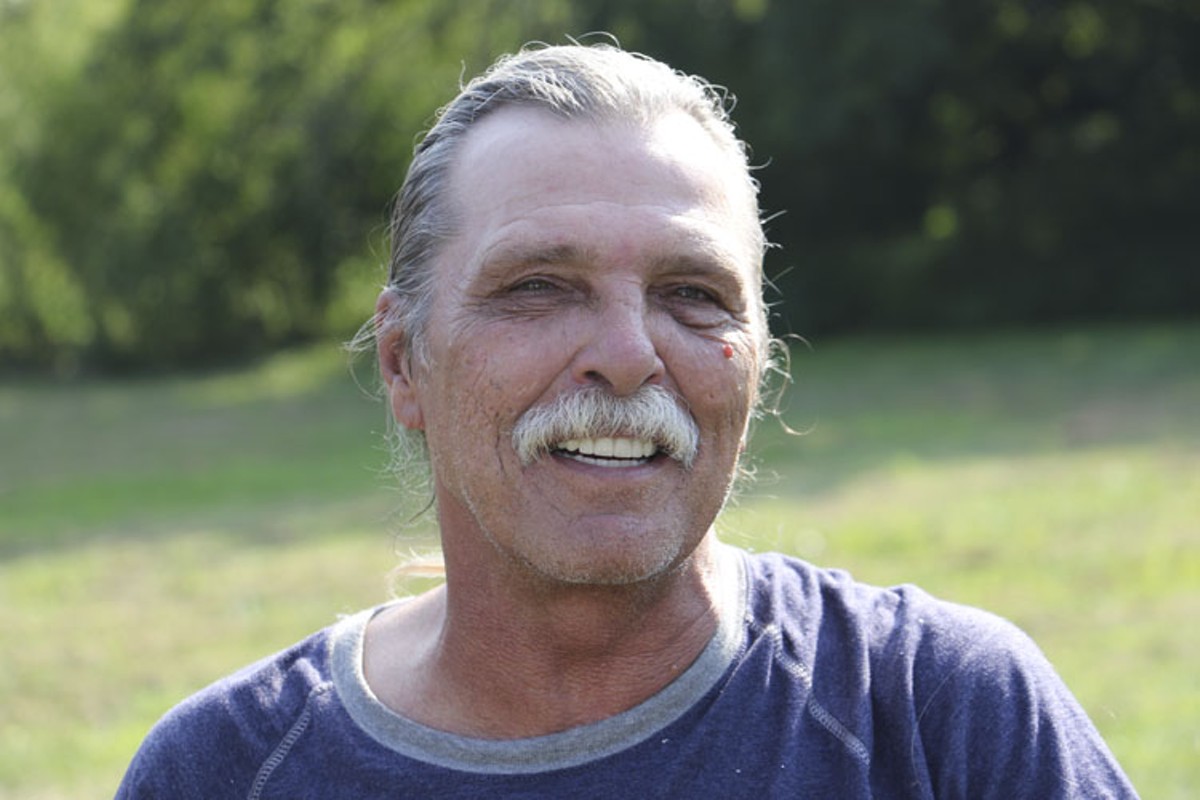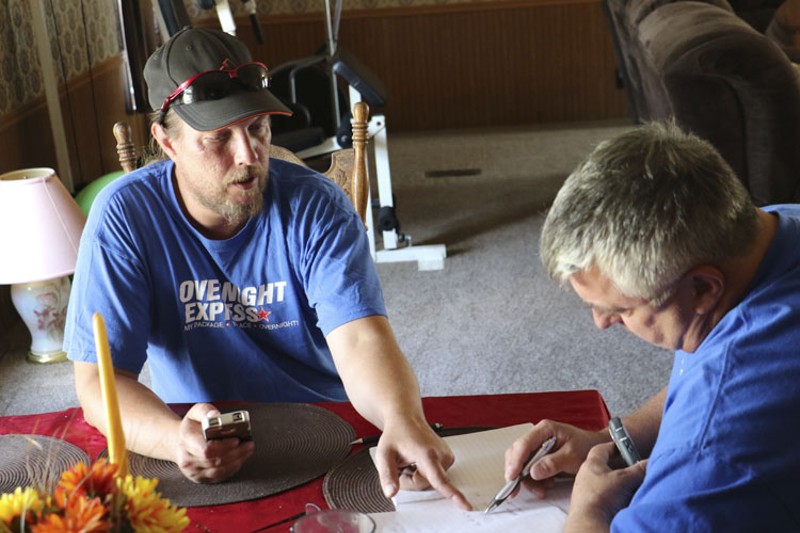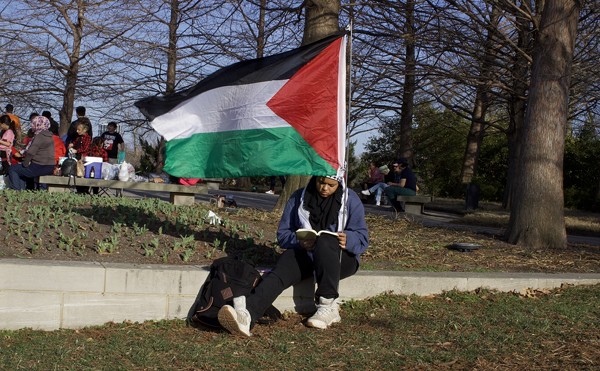Over the years, in between factory shifts, Mizanskey worked on appeals. They proved a series of letdowns, climaxing when he learned that his sentence came without the possibility of parole.
The unusual sentence was an extreme result of Missouri's unusual three-strikes law. Under the state statute, a person with three drug-related felonies can be subject to a minimum of ten years and a maximum of life in prison without parole if a prosecutor chooses to charge him as a "prior and persistent drug offender." According to the American Civil Liberties Union, no other state in the country has a drug-specific three-strikes law.
All three of Mizanskey's felonies had been for marijuana and had come over the course of ten years. In 1984, he was busted for possessing a half-pound and selling an ounce. In 1991, police searched Mizanskey's home after an informant said he was carrying. Police only found two ounces, but anything more than 35 grams is a felony in Missouri, and Mizanskey got his second strike.
The third and final strike came in December 1993 when he drove a man to a hotel to check out a seven-pound brick.
The man, Atilano Quintana, was a known drug dealer — but unbeknownst to either him or Mizanskey, he was being set up by two men working with Sedalia police. The men had been busted with close to 100 pounds of pot the day before and claimed they were bringing it to Quintana. In return for helping the police get Quintana, the two were promised leniency.
Sergeant James Wingo, the highway patrolman who organized the Quintana sting and watched it go down via a hidden camera, told the Riverfront Times in 2013 that Mizanskey was there in a supporting role for Quintana.
"You do a dope deal, you bring your extra hand around," Wingo said. "For lack of a better word, [Mizanskey] was his 'helper,' I guess."
Mizanskey first filed for post-conviction relief in 1997, arguing that his attorney at trial had been ineffective because he did not object to his client being sentenced as a "prior and persistent drug offender." The motion was denied in March 1999.
A year later, Mizaskey's public defender tried to get the Missouri Supreme Court to hear the case. He argued that the original attorney had failed to call a key witness and failed to object when the prosecutor referenced damning details about Quintana's drug activities. After all, Mizanskey was only on trial for his involvement in one transaction — the six pounds in the hotel room. But the court declined to hear the case.
Mizanskey filed another appeal the next year. Yet again, he was denied.
Mizanskey attempted a final shot in 2010 when he filed an appeal arguing that Theodore Scott, the Benton County judge who'd sentenced him, didn't intend the sentence to be life without parole, and that a clerical error was responsible for what was arguably the harshest drug sentence in the nation. After all, Scott never said in court that the sentence was to be "without parole" — he said only that Mizanskey had to serve a life sentence, which is typically treated as 30 years, allowing a parole hearing as early as 2005. But in the paperwork filed after Scott handed down the sentence, a clerk checked in the "without parole" box.
In April 2011, the appeals court denied Mizanskey again. There just wasn't enough proof, the judge concluded, that Scott didn't intend for Mizanskey to die in prison.
There was nowhere else to go but the governor of Missouri.
In early 2012, Tony Nenninger, a lawyer and cannabis activist based out of Columbia, attended a town hall hosted by Show-Me Cannabis. That's where he met Chris Mizanskey, who told him about his father's egregious sentence. Nenninger has told the Riverfront Times that he was flabbergasted and looked into ways he could help. Ultimately, he advised Mizanskey to seek clemency from Governor Nixon.
In March 2012, Mizanskey filed an application for clemency. He seemed like the perfect candidate for the rare privilege: He was in prison for nonviolent crimes, he had worked steadily in prison and completed every single rehabilitation program on offer — drug counseling, self-improvement, you name it.
In addition, selling marijuana is no longer considered a crime in Colorado and Oregon (with the proper documentation, of course), and Oregon and Alaska have recently passed legislation to join the trend in the next few months. Public attitudes toward weed have shifted dramatically, with legalization on the rise in several states and quite possibly the country. Even Missouri may soon consider some sort of medical-marijuana initiative.
Still, Nixon would not be an easy sell. The governor — who had previously been the state's attorney general — had never once granted clemency since taking office in 2009, and a backlog of several hundred clemency petitions sat unanswered.
Months passed without action. Then, in October 2013, Nenninger wrote a short blog post about Mizanskey's case on the National Cannabis Coalition website. The post urged readers to send letters to Nixon asking for clemency.
"It is rare that a case gets enough of a governor's attention to be seriously considered," Nenninger wrote. "However, like all politicians, Governor Nixon will notice if enough citizens call a political issue to his attention."
Four days later, the Riverfront Times published a story about the case that got picked up by several national news organizations. Online comments showed a mix of mostly outrage and disbelief. And Show-Me Cannabis decided to make a push to persuade Nixon to grant clemency synonymous with its effort to reform Missouri's marijuana laws.
"We did about 40 town hall meetings in 2013 and 2014," says John Payne, the executive director of Show-Me Cannabis. Crowds ranged between 50 and 200 people, many of them interested in Mizanskey's case.
The first question was, 'What can we do to get this guy out of jail?'" Payne says. "People had a very profound sense of injustice when they heard about the case, and they wanted to do something to right that wrong. It definitely became a cause célèbre among cannabis activists in Missouri everywhere we went."
Via Facebook, Show-Me Cannabis posted photos with an invitation to take action. Anybody who texted "Jeff" to the easy-to-remember "420420" would get alerts to call the governor's office. The simple social-media campaign prompted more than 800 calls in its first few months alone. "That may not seem like a whole lot for the entire state of Missouri, but in politics, a few phone calls could mean quite a lot," Payne says.
The texts primarily came from Missouri, but people from around the country chimed in, especially whenever a news story about the campaign spread through social media. Mizanskey's story made it to the front page of Reddit a few times — "whenever that happened, the texts spiked," Payne says.
Five months after Mizanskey's story first hit the Internet, Show-Me Cannabis came up with a new idea to garner support: billboards. A story about the plan rose to the top of Reddit, garnering another round of national and international attention. The organization raised more than $10,000 to publicize Mizanskey's case.
Billboards near Sedalia and in Jefferson City questioned the sentence — "Life without parole for cannabis? It's time to fix our unjust marijuana laws" — and asked people to call Nixon and demand Mizanskey's freedom. But the governor, whose own son had been arrested for marijuana possession in 2011, was still silent.
From CNN to local TV news stations and even a German news crew that flew in from Hamburg, Mizanskey was by far the most visited prisoner at the JCCC. The inmate told his story to whoever was willing to make the drive to No More Victims Road, the ironically named location for the new Jefferson City Correctional Center, which replaced The Walls in 2006.
And while Mizanskey spoke out about the injustice he felt he had suffered, he also was honest about his views on marijuana, refusing to temper his beliefs to make his cause more palatable to Missouri politicians. He praised marijuana's medical benefits, telling journalists that it's safer and less addictive than alcohol and prescription painkillers. He also said repeatedly that if he got out, he would join the marijuana-reform cause. The biggest victim of Missouri's marijuana laws became the most vocal advocate to change them.
Mizanskey's words were having an effect. When RFT spoke to the prosecutor in Mizanskey's case, Jeff Mittelhauser, in November 2013, he insisted that the sentence was appropriate and felt no regret for asking the judge for life without parole. But by the spring of 2014, after Mizanskey's story was told by news organizations around the country, Mittelhauser, who was then running for judge in Pettis County, told a Kansas City TV station that he supported clemency.
As Mizanskey did more interviews, his son Chris was also becoming a polished spokesman for the family. A good-natured 37-year-old bar owner who lives on the same street he grew up on in Sedalia, Chris told the story of losing his father at a young age to the criminal-justice system, bringing home the message that draconian prison sentences affect entire families. Media reports would often note that Mizanskey had become a great-grandfather.
Other family members assisted, too. Amber Ward, Mizanskey's niece, ran the Free Jeff Mizanskey Facebook page, which accumulated several thousand likes. She also had bumper stickers and T-shirts made. And soon Mizanskey's brother Mike would come down from Chicago to help with the effort that would ultimately lead to Mizanskey's release.







